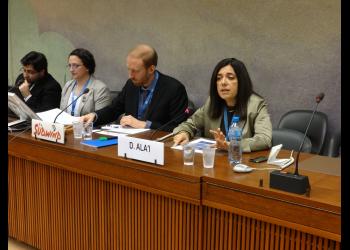Iran report on human rights is inaccurate, say rights groups
A report by the Iranian government to the UN Human Rights Council grossly distorts the progress Iran has made in improving its human rights record, said representatives of three human rights groups yesterday.
In a side event at the Council, held two days before Iran is scheduled to undergo a major review of its human rights efforts, Diane Ala’i of the Baha’i International Community, Sholeh Zamini of Sudwind, and Rod Sanjabi of the Iran Human Rights Documentation Center (IHRDC) offered numerous examples of the way in which Iran was inaccurate in its report.
They warned that governments should be skeptical of any new promises or statements that Iran makes on Friday during its Universal Periodic Review (UPR).
Ms. Ala’i, the representative of the BIC to the United Nations in Geneva, spoke first, saying Iran had utterly failed to deliver on promises it made regarding the treatment of Baha’is at the last UPR, which was held in February 2010.
“In 2010, the government of Iran accepted a number of recommendations that would, if implemented, improve the situation of Baha’is,” said Ms. Ala’i. “But during the last four years, none have been acted upon.”
She said a BIC report, “Unfulfilled Promises,” documented how all 34 recommendations affecting the situation of Baha’is have remained unimplemented.
Ms. Ala’i also said the government’s 2014 national report on human rights inaccurately described the situation of Iranian Baha’is, who have been systematically persecuted since the 1979 Islamic Revolution.
She noted, for example, that Iran’s report states that “the rights of all citizens – including the followers of the Baha’i sect – are respected.”
However, she said, Baha’is are blatantly discriminated against in employment and education, proving that they do not enjoy all the rights of citizenship.
“Baha’is are not allowed to work in the public sector at all, and in the private sector there are a lot of restrictions imposed upon them,” said Ms. Ala’i.
And in education, she said, “Baha’i youth are not allowed to study in Iranian universities – as soon as they are identified as Baha’is, they are expelled.”
Ms. Ala’i said the government’s report also wrongly claimed that the seven imprisoned Baha’i leaders received a fair trial in 2010, something that was the subject of a number of recommendations by governments at Iran’s last UPR that year.
Moreover, she said, the report was factually incorrect in saying that the seven – currently serving wrongful 20 year prison sentences -- have enjoyed “the same facilities and concessions that are given to other inmates – including health and medical care, numerous family visitations and furloughs.”
“They have not been allowed one single day of furlough, and it has been six years now that they’ve been imprisoned,” said Ms. Ala’i.
Ms. Zamini of Sudwind, an Austrian based NGO, focused on women’s rights in Iran.
“The reality of Iran on the issue of women is totally different than what is written in their report,” said Ms. Zamini. She cited a recent UNDP report that ranked Iran 128 out of 187 countries on a “Gender Development Index.”
Ms. Zamini said in a number of areas – in health, education, employment, and social welfare – Iranian women are not treated equally with men. “The laws for women are different than laws for men,” she said.
Mr. Sanjabi, executive director of the US-based IHRDC, focused on Iran’s legal system, saying Iran has failed to live up to international law regarding legal due process, especially in pretrial detention, despite claims in its national report that it had made improvements to its criminal procedures.
“There are countless reports of physical and psychological torture being applied to extract confessions,” said Mr. Sanjabi.
“And when prisoners are allowed to meet with their attorneys, they are only given a few minutes with them, often just before trial proceedings begin.”
Mr. Sanjabi said Iran’s entire approach to human rights lacks good faith. “The Islamic Republic of Iran has complete disregard for the principle of legality,” said Mr. Sanjabi.
Iran is scheduled to undergo its second UPR on Friday morning, at 9 am Geneva time. The session can be viewed by webcast at http://webtv.un.org/
